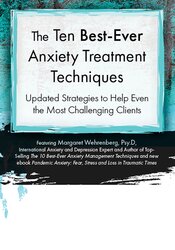

Dr. Margaret Wehrenberg will assist you in shaping the 10 Best-Ever Anxiety Techniques to your needs and will discuss:
This fresh approach will give you a complete set of tools to work with anxiety symptoms. Cutting-edge research tells clinicians not only what is new, but also tells us why what we have done best over the years works to help clients achieve positive results in therapy. In this seminar, you will learn, practice and be ready to apply 10 techniques that really work to stop symptoms of panic, worry and social anxiety.
These 10 proven methods can control most symptoms of panic, generalized anxiety and social anxiety. Through in-seminar practice and discussion case vignettes to illustrate their applications – you can make them strong, effective and lasting interventions. Methods that control physiology: diaphragmatic breathing, reducing tension, mindful awareness to offset panic or acute anxiety can be easy to learn but not simple to apply. We will discuss how to make them effective with different age groups and difficult clients if you want to obtain the best results for calming panic and dread.
Likewise, controlling the cognitive problems of anxiety, such as catastrophizing or ruminatively worrying, challenge most with anxiety. Learn powerful techniques that cool off worry (“Worry well and only once!” “Knowing, Not Showing Anger”), and challenge faulty cognitions, the obstacles to improving panic and social anxiety (“Counter Cognitions”, etc.). You can help your clients identify and change the ways they avoid their social anxiety. Case examples will clarify planned re-entry to triggering situations, handling the stress of preparation and conducting in vivo exposure.
| File type | File name | Number of pages | |
|---|---|---|---|
| Manual - Ten Best-Ever Anxiety Treatment Techniques (0.92 MB) | 48 Pages | Available after Purchase |

Margaret Wehrenberg, PsyD, a licensed clinical psychologist, is the author of nine books on the treatment of anxiety and depression, including her most recent e-book, Pandemic Anxiety: Fear, Stress, and Loss in Traumatic Times (January, 2021), bestselling book, The 10 Best-Ever Anxiety Management Techniques (W.W. Norton, 2018), and You Can Handle It: 10 Steps to Shift Stress from Problem to Possibility (PESI, 2017). She has also written a book for the general public, The 10 Best Anxiety Busters.
An expert on the treatment of anxiety and depression, she also has extensive training and expertise in the neurobiology of psychological disorders. In addition to clinical work, she coaches business professionals on managing anxiety and has contributed articles for the Psychotherapy Networker magazine. She has produced Relaxation for Tension and Worry, audio soundtracks for breathing, muscle relaxation and imagery to use with anxious clients. Margaret blogs on depression for Psychology Today. Noted for humor, pragmatic treatment approaches, and her interactive teaching style, Dr. Wehrenberg is a sought-after speaker for conferences and trainings, consistently getting the highest ratings for her dynamic presentation and high-quality content. She is one of PESI’s most highly rated speakers and her evaluation from the most seasoned professionals often rank her training “as among the best I have ever attended.”
Speaker Disclosures:
Financial: Dr. Margaret Wehrenberg maintains a private practice. She receives royalties as a published author. She is an international presenter and receives compensation. Dr. Wehrenberg receives a speaking honorarium, book royalties, and recording royalties from Psychotherapy Networker and PESI, Inc. She has no relevant financial relationships with ineligible organizations.
Non-financial: Dr. Margaret Wehrenberg is a member of the Anxiety Disorder Association of America.
Please wait ...